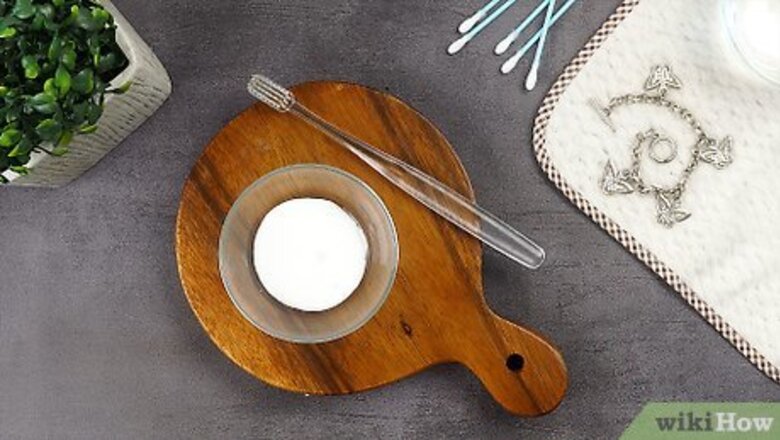
views
Cleaning Silver Jewelry
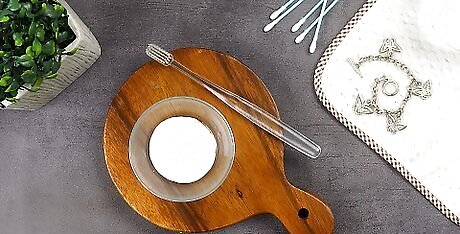
Understand that while toothpaste is great for cleaning silver jewelry, it can damage silver as well. Toothpaste contains abrasive particles that can polish off tarnish. These same particles can scratch silver up as well. In particular, you should avoid using toothpaste on sterling silver, highly-polished silver, or anything that is silver-plated. These items are very soft and can be easily damaged by the toothpaste. The best way to clean these delicate items is to buff them with a silver polishing cloth. Toothpaste is considered safe for satin or matte silver. Make sure that the patina is not intentional. Some jewelers intentionally "age" their pieces to make them look more rustic. Consider taking fragile or antique pieces to a professional cleaner.
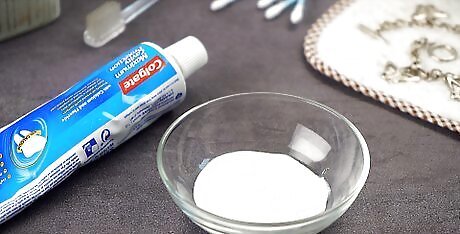
Choose a plain, solid-colored toothpaste with no baking soda, tartar control, or whitening agents. These "extras" are too abrasive and can scratch your jewelry. At the same time, however, you'll want to avoid using gel toothpaste because it isn't abrasive enough to remove tarnish.
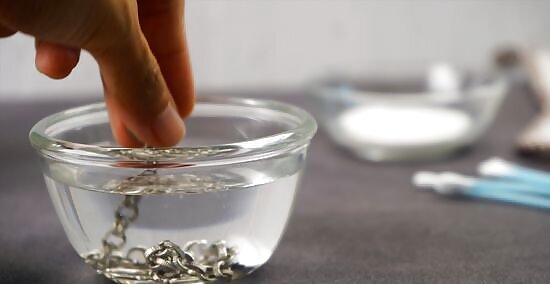
Dampen the silver with some water. This will help soften the toothpaste and make it easier to spread. You can dampen jewelry by squirting it with some water in a spray bottle, or by dipping it into a bowl filled with water. Avoid working over a sink; if you drop the jewelry, you may lose it down the drain.
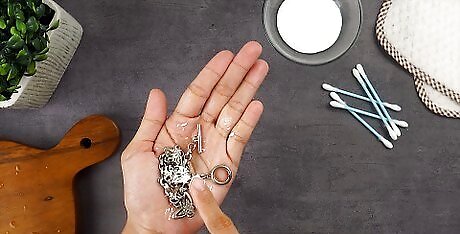
Apply a small amount of toothpaste to the jewelry. Start with a pea-sized amount—smaller if you are cleaning something tiny, such as a post earring. You can use your finger, a sponge, a paper towel, or even a q-tip to apply the toothpaste.
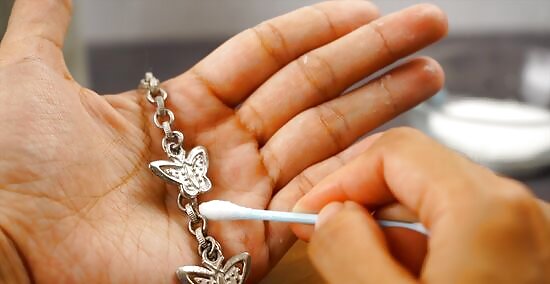
Rub the jewelry gently with a damp tissue, paper towel, or q-tip. Use a light touch so that you don't accidentally scratch the silver. Use tissues and paper towels for larger items, such as bracelets, and q-tips for small items, such as earring hooks. If you are cleaning a necklace chain, run the chain through a folded paper towel. Use caution around gemstones, especially around amber, emeralds, lapis, and turquoise. These tend to be very soft, and can easily be scratched up by toothpaste. The paper towel, tissue, or q-tip may turn dark. This is a good thing; it is the tarnish coming off the jewelry.
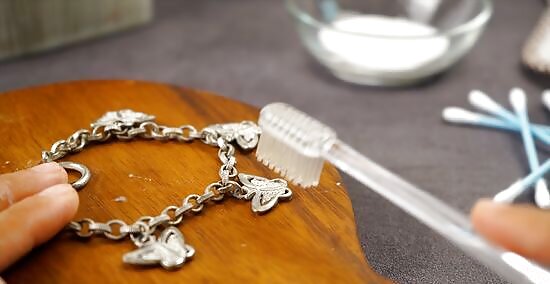
Use a damp, soft-bristled toothbrush to clean out grooves and intricate designs. Some pieces, such as rings and brooches, have nooks and crannies that are hard to reach, even with a q-tip. For these pieces, you can gently scrub them using a toothbrush. Baby toothbrushes and toothbrushes for sensitive gums tend to have the softest bristles. Don't use this toothbrush for anything else other than jewelry cleaning.
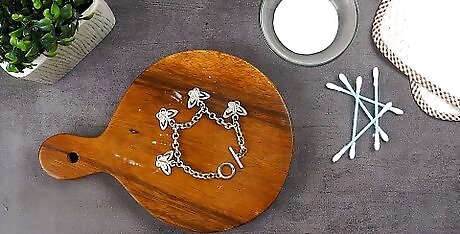
Let the toothpaste sit for about 2 to 3 minutes for stubborn stains. This will give the ingredients in the toothpaste to work on tough tarnish.
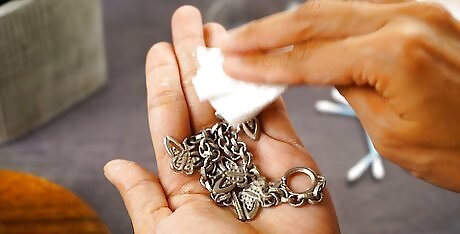
Wipe the residue off with a clean paper towel, tissue, or q-tip. Once again, if you are cleaning a necklace chain, gently pull the chain through a new, folded paper towel. You may notice the tarnish disappearing, and the silver becoming brighter.
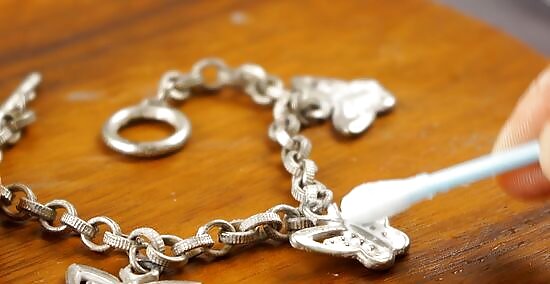
Keep adding toothpaste and rubbing it off until the tarnish is gone. Depending on how badly tarnished the piece is, this can take about 15 minutes.
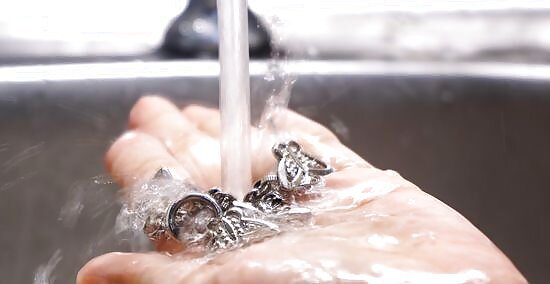
Rinse the jewelry in warm water. The best way to do this is to plug your sink and rinse the jewelry under running water. If you are too hesitant to do this, you can also dip the jewelry in a bowl of warm water, and rub the toothpaste residue off.
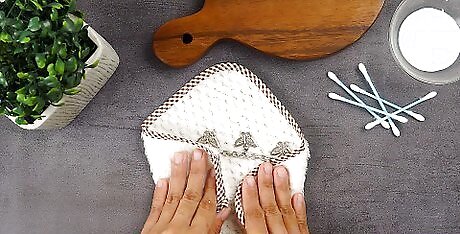
Gently pat the jewelry dry with a soft cloth, then let it air-dry before putting it away. Use a soft cloth, such as microfiber, to dry the jewelry. Once you have gotten most of the water off, place it onto a clean, soft towel. Wait until it dries completely before storing it. This is especially important for pieces with lots of nooks and crannies, such as chains and ornate brooches.
Keeping the Tarnish Away
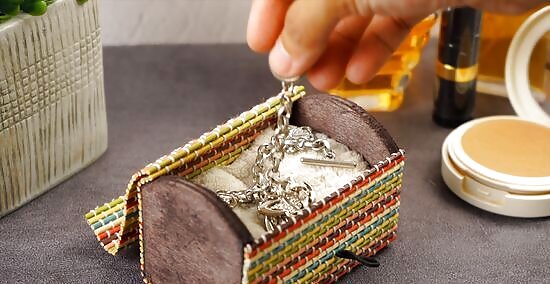
Store your jewelry someplace cool and dry. Humidity causes jewelry to tarnish faster, so the more you limit the humidity, the slower your jewelry will tarnish. Here are some tips for storing silver jewelry: Store chains and earrings in anti-tarnish or tarnish-proof bags. You can buy them in jewelry stores. Wrap larger pieces, such as brooches and bracelets, in anti-tarnish cloths. Get a jewelry box that is lined with tarnish-free material to limit the rate of tarnishing. Consider adding an anti-tarnish strip to your jewelry bags. You will need to change these strips every 2 to 3 months. Try adding a silica gel pack to your jewelry boxes. They will absorb the moisture.
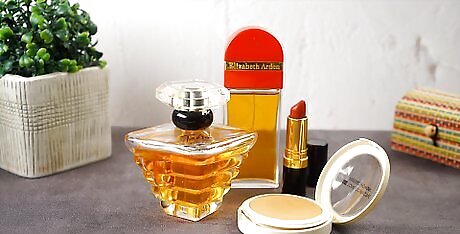
Put on all your hair products, lotions, makeup, and perfume before you put on the jewelry. If you are using wet or oily cosmetics, such as lotions, wait for them to dry completely before you put on your jewelry. Cosmetics contain chemicals that can not only speed up tarnishing but also damage silver.
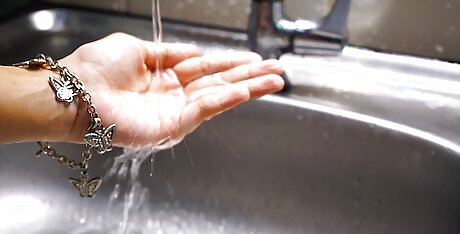
Don't wear your jewelry where it might get wet. This includes activities such as bathing, cleaning, exercising, showering, or swimming. Sweat, tap water, and household cleaning products can all cause jewelry to tarnish faster. In some cases, the chemicals in tap water and household cleaning products can also damage silver.
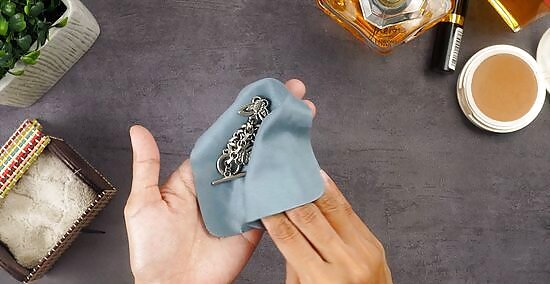
Wipe your jewelry clean with a silver polishing cloth before putting it into storage. Throughout the day, your jewelry will come into contact with things like body oils, dirt, lotions, and sweat. All of these can cause silver to tarnish faster. You will want to clean these off before you put your jewelry away.











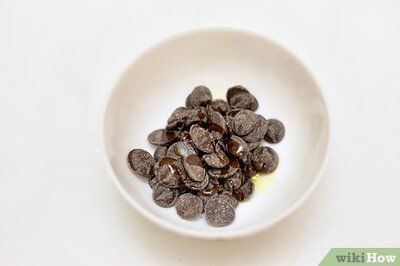



Comments
0 comment